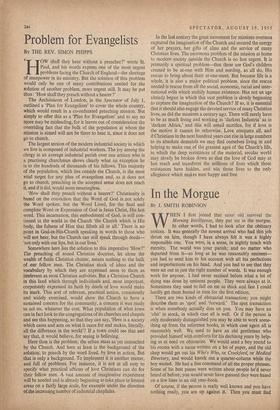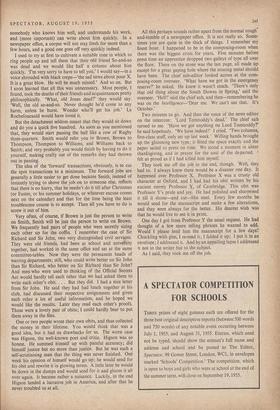In the Morgue
BY J. SMITH ROBINSON WHEN I first joined that stout old survival the Morning Intelligence, they put me in the morgue. In other words, I had to look after the obituary notices. It was generally the newest arrival who had this job thrust on him, though I have always felt it was a highly responsible one. You were, in a sense, in nightly touch with eternity. The world was your parish; and no matter who departed from it—so long as he was reasonably eminent— you had to send him to his account with all his perfections and imperfections on his head. And you had to see that they were set out in just the right number of words. It was enough work for anyone. 1 had never realised before what a lot of dying was done by eminent people. They were always at it. Sometimes they used to fall on me so thick and fast I could hardly get them buried in time for the first edition.
There are two kinds of obituarial transaction; you might describe them as 'spot' and 'forward.' The spot transaction is when somebody actually dies on you. You may have an `obit' in stock, in which case all is well. Or if the person is only moderately distinguished you may be able to work some- thing up from the reference books, in which case again all is reasonably well. We used to have an old gentleman who provided himself with comforts for his declining years by help- ing us at need on obituaries. We would send a boy round to his rooms with a name written on a bit of paper, and the old chap would get out his Who's Who, or Crockford, or Medical Directory, and would knock out a quarter-column while the boy waited. He had a fine command of all the proper phrases. Some of his best pieces were written about people he'd never heard of before; you would never have guessed they were based on a few lines in an old year-book.
Of course, if the person is really well known and you have nothing ready, you are up against it. Then you must find somebody who knows him well, and understands his work, and (more important) can write about him quickly. In a newspaper office, a corpse will not stay fresh for more than a few hours, and a good one goes off very quickly indeed.
I used to try at first to cultivate a suitable tone in which to ring people up and tell them that their old friend So-and-so was dead and we would like half a column about him quickly. `I'm very sorry to have to tell you,' I would say—in a voice shrouded with black crepe—`the sad news about poor X. It is a great blow. He will be much missed.' And so on. But I soon learned that all this was unnecessary. Most people, 1 found, took the deaths of their friends and acquaintances pretty philosophically. 'What, old Jones dead?' they would say. `Well, the old so-and-so. Never thought he'd come to any harm, unless he burst. Wonder who'll get his job.' La Rochefoucauld would have loved it.
But the detachment seldom meant that they would sit down and do you a quick five hundred. As soon as you mentioned that, they would start passing the ball like a row of Rugby three-quarters. Smith would refer you to Brown, Brown to Thompson, Thompson to Williams, and Williams back to Smith; and very probably you would finish by having to do it yourself, making crafty use of the remarks they had thrown out in passing.
The idea of the 'forward' transactions, obviously, is to cut the spot transactions to a minimum. The forward jobs are generally a little easier to get done because Smith, instead of instantly trying to shove the job on to someone else, reflects that there is no hurry, that he needn't do it till after Christmas (or Easter, or his summer holidays, or whatever excuse comes next on the calendar) and that for the time being the least troublesome course is to accept. Then all you have to do is screw it out of him. - Very often, of course, if Brown is just the person to write on Smith, Smith will be just the person to write on Brown. We frequently had pairs of people who were secretly sizing each other up for the coffin. I remember the case of Sir Richard and Sir John, two very distinguished civil servants. They were old friends, had been at school and university together, had worked in the same office and sat at the same committee-tables. Now they were the permanent heads of warring departments; still, who could write better on Sir John than Sir Richard, who better on Sir Richard than Sir John? And men who were used to thinking of the Official Secrets Act would hardly tell each other that we had asked them to write each other's obit. . . . But they did. I had a nice letter from Sir John. He said they had had lunch together at his club, had discussed their respective assignments and given each other a lot of useful information, and he hoped we would like the results. Later they read each other's proofs. Those were a lovely pair of obits; I could hardly bear to put them away in the files.
One or two people wrote their own obits, and thus collected the money in their lifetime. You would think that was a good idea, but it had its drawbacks for us. The worst case was Higson, the well-known poet and critic. Higson was so honest. He summed himself up with painful accuracy; did himself justice but no more than justice. But he was such a self-scrutinising man that the thing was never finished. One week his opinion of himself would go up; he would send for his obit and rewrite it in glowing terms. A little later he would be down in the dumps and would send for it and gloom it all over again. It became rather a nuisance. Luckily, in the end Higson landed a lucrative job in America, and after that he never troubled us at all. All this perhaps sounds rather apart from the normal rough' and-tumble of a newspaper office. It is not really so. Some- times you are quite in the thick of things. I remember my finest hour. I happened to be in the composing-room when there was the biggest crisis for years. Five minutes before press time an apprentice dropped two galleys of type all over the floor. There on the stone was the last page, all made up except for a great gaping hole where the missing metal should have been. The chief sub-editor looked across at the com- posing-room overseer. 'What have we got in the emergency reserve?' he asked. He knew it wasn't much. 'There's only that old thing about the South Downs in Spring,' said the overseer. 'Hell !' said the chief sub, and then—remembering he was on the Intelligence—`Dear me. We can't use that. It's October.'
Two minutes to go. And then the voice of the news editor on the intercom: 'Lord Tomnoddy's dead.' The chief sub turned to me. `HaVe we got anything on Lord Tomnoddy?' he said hopelessly. 'We have indeed!' I cried. 'Two columns, first-class stuff, only set up last week.' Willing hands brought up the glistening new type; it fitted the space exactly and the paper sailed to press on time. We stood a moment in silent thanksgiving, and in prayer for the soul of the departed. felt as proud as if I had killed him myself.
They took me off the job in the end, though. Well, they had to. I always knew there would be a disaster one day. It happened over Professor X. Professor X was a crusty old character at Oxford, and 1 had had his obit written by his ancient enemy Professor Y, of Cambridge. This obit was Professor Y's pride and joy. He had polished and sharpened it till it shone—and cut—like steel. Every few months he would send for the manuscript and make a few alterations, and they were always for the better. His dearest wish was that he would live to see it in print.
One day I got from Professor Y the usual request. He had thought of a few more telling phrases he wanted to add. Would I please lend him the manuscript for a few days? Chuckling with glee, 1 re-read it; I folded it up; I put it in an envelope; I addressed it. And by an appalling lapse I addressed it not to the writer but to the subject.
As I said, they took me off the job.



































 Previous page
Previous page